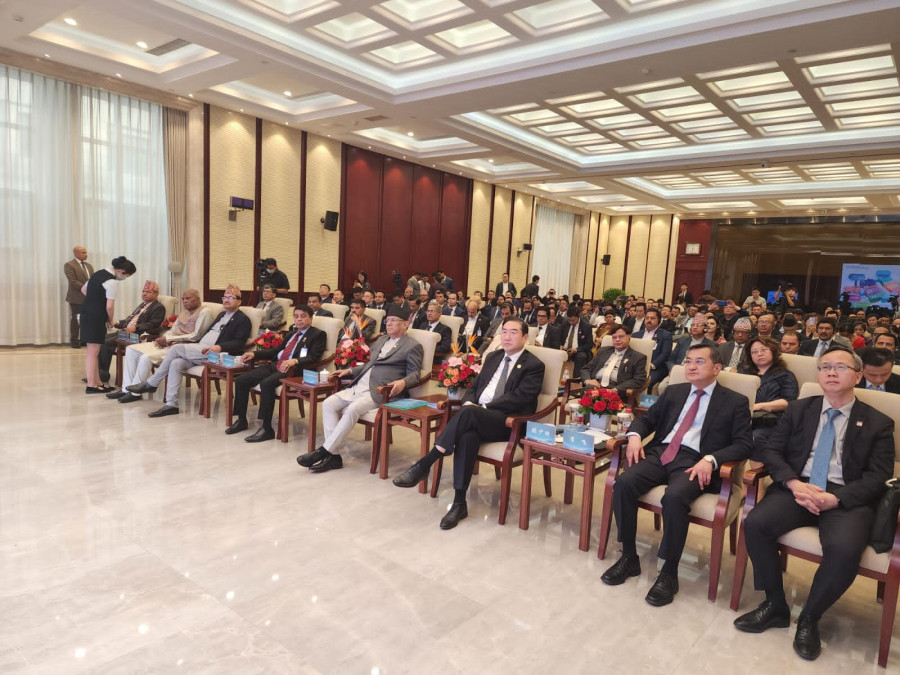Money
FNCCI urges Chinese banks’ presence in Nepal
At a separate event, CNI and China Council for the Promotion of International Trade signed a Memorandum of Understanding to establish Nepal-China Business Council to strengthen the economic ties between Nepal and China.
Post Report
Nepal's apex private sector body has urged the presence of Chinese banks in Nepal to facilitate and enhance bilateral trade and investments between the two neighbours.
“We strongly recommend that a Chinese bank consider forging a partnership with Nepali banks or establishing its own operations in Nepal,” said Chandra Dhakal, president of the Federation of Nepalese Chambers of Commerce and Industry while addressing the Nepal-China Business Summit, in Beijing, on Sunday, during Prime Minister Pushpa Kamal Dahal's official visit to China.
There are, currently, no Chinese banks operating in Nepal.
Dhakal said that several commercial banks with foreign investment, including Standard Chartered Bank, SBI, and Everest Bank, have established a robust presence and demonstrated strong performance in the market.
“Nepal maintains substantial trade relations with China, accounting for approximately one-fifth of our imports.”
The federation has urged the Chinese business community to invest in Nepal's hydropower sector, both for domestic consumption and export to neighbouring countries including China.
Besides this, according to the federation, the popularity of Chinese electric vehicles in Nepal highlights the need for expanded hydropower capacity to support EV charging infrastructure. “This offers a significant opportunity for Chinese private sector investment in Nepal's hydropower development,” said Dhakal.
China is Nepal's largest source of foreign direct investment (FDI).
The federation said in a statement that the Nepal-China Business Summit serves as a timely platform for discussing ways to further strengthen economic cooperation.
“This summit brings together business leaders from both countries to explore opportunities for investment, trade, and technology transfer, and I am confident that it will lead to concrete outcomes that will benefit both Nepal and China,” said Dhakal.
Nepal enjoys non-reciprocal and exclusive treaties with India, providing duty-free access to Nepali products in India. Similarly, Nepali products have duty-free access to China, as well as to the EU, US, Canada, Australia, and other developed countries. This opens up opportunities for investments and production in Nepal with potential for global exports.
China is Nepal's second-largest trading partner. Nepal imports 16 percent of its total goods from China. However, Nepal’s exports to China remain modest.
However, Nepal has proven to be a trusted destination for Chinese investments. China’s investment accounts for over 35 percent of the total approved foreign direct investments, the federation said.
“We anticipate a boost in FDI inflows from China, maintaining China as the largest source of FDI for Nepal,” said Dhakal. “Multinational companies operating in Nepal have enjoyed a favourable rate of return on their investments.”
The federation has established an FDI help desk to provide one-window facilitation support to foreign investors.
Dhakal said that Nepal's hospitality industry is ready to welcome Chinese tourists with numerous standard hotels catering to their needs. “This year has seen significant progress in tourist infrastructure, with two new international airports, Bhairahawa and Pokhara, operational in major tourist destinations.”
He urged Beijing to begin direct flights to the new airports. The Pokhara airport is funded by a Chinese loan while the Bhairahawa airport has been constructed by a Chinese contractor.
Apart from hydropower, tourism, and manufacturing, the ICT sector and ICT-enabled services are expected to experience a high demand post-Covid-19, with opportunities in e-commerce, digital payment, logistical services, and distance learning, the federation said.
Investment in tourism infrastructure, such as cable cars, theme parks, and resorts, holds great promise in Nepal, it added.
President Dhakal urged China to facilitate cross-border trade and ensure the smooth movement of goods and people for bilateral socio-economic integration.
“The removal of trade barriers, including non-tariff measures, along with full implementation of the Trade Facilitation Agreement, will lead to increased mutual benefits from bilateral trade.”
“Together, we can unlock opportunities, strengthen ties, and contribute not only to Nepal and China but also to regional prosperity.”
Meanwhile, in a remarkable development during Prime Minister Pushpa Kamal Dahal's official visit to China, the Confederation of Nepalese Industries (CNI) and the China Council for the Promotion of International Trade (CCPIT) solidified their commitment to strengthen economic ties and cooperation between Nepal and China.
The CNI and CCPIT signed a Memorandum of Understanding on Sunday paving the way for the establishment of the Nepal-China Business Council, reflecting the deep-rooted friendship and the strategic geographical proximity between the two nations.
The primary objective of the Nepal-China Business Council is to enhance bilateral
economic cooperation between the two friendly nations.
To achieve these goals, CNI and CCPIT have outlined a comprehensive roadmap, including the formation of the council itself. Under the terms of the MoU, the Nepal China Business Council will consist of four members, with two representatives nominated by each organisation.
Likewise, the council's functions will encompass the exchange of valuable information and
insights to streamline business activities, conduct research and study-related initiatives,
creating networking opportunities to fuel growth in business, trade, and investment, and
organising exchange visits, conferences, and dialogues.
The MoU was formally signed by Rajesh Kumar Agrawal, president of CNI,
and Zhang Shaogang, Vice Chairman of CCPIT.
“The Nepal China Business Council is poised to become a pivotal platform for attracting Chinese investment and technology, while also fortifying business relations between Nepal and China,” said Agrawal.




 8.43°C Kathmandu
8.43°C Kathmandu













